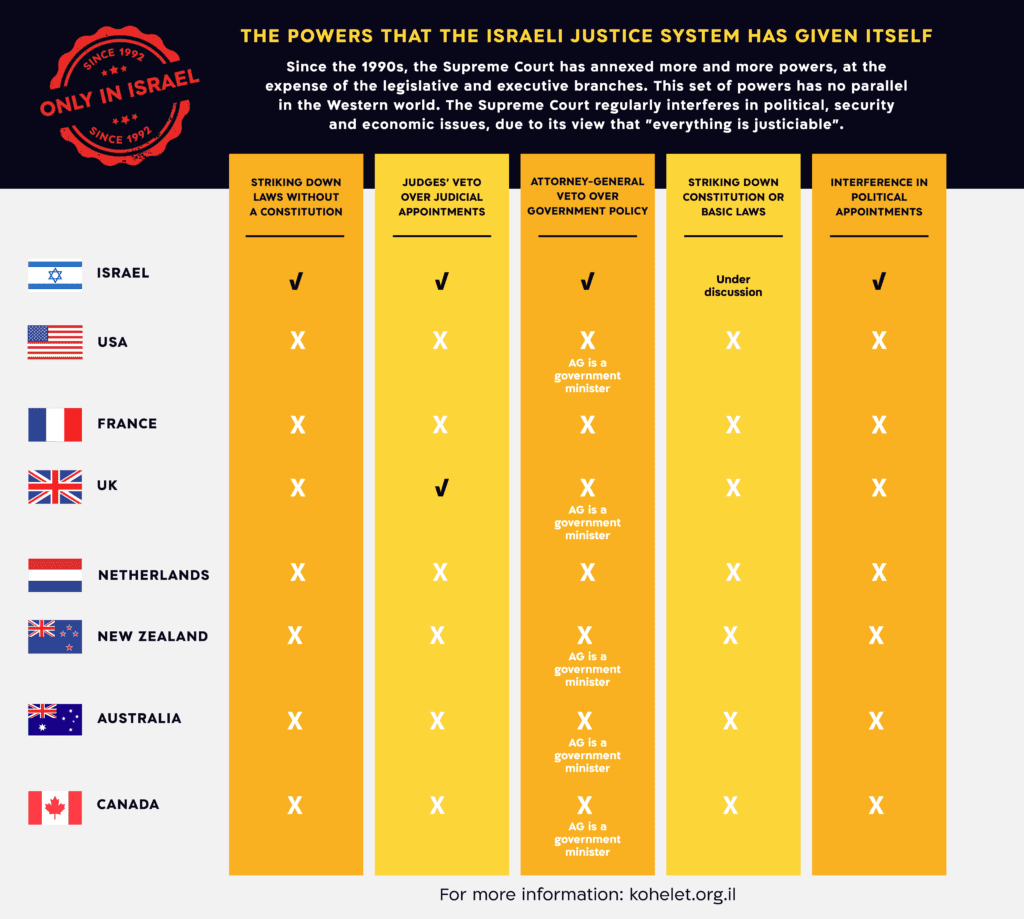By Aharon Garber and Avraham Shalet, KOHELET
Like all liberal democracies, Israel needs a strong court and independent judges who will guard the rule of law, good governance, and civil and human rights.
In the past decades, the Supreme Court has empowered itself in a manner that completely violates the balance between government branches. In a series of decisions, the Supreme Court has changed the rules of the game and arrogated for itself jurisdiction which it was not given, some of these being exceptional by international standards. Against the basic concept of rule of law according to which the Court judges according to the rules set by the legislature, the Israeli Supreme Court has designed its own rules, and unilaterally taken unauthorized power, without any public legitimacy. In parallel, the Court has adopted the position that “everything is justiciable”, transforming itself into the sole adjudicator in almost all public and political controversies, large or small. The Court has interfered in issues of foreign policy, security, economic policy, and even who will receive the Israel Prize.
Many controversial decisions taken in the past by elected officials – such as advancement of Jewish settlements, funding events in support of terrorism, or calling for anti-Israel boycotts, or even decisions regarding imposing taxes, tax benefits, private prisons or raising the prices of food essentials – have become issues that are brought to the Court’s final ruling.
The Supreme Court has invented new legal grounds to review the reasonableness of government actions and even to disqualify government appointments. It has adopted interpretations that allow it to veer from the law and the legislator’s intent. It has created new powers ex nihilo in order to strike down laws by virtue of the Basic Laws, after it declared on its own authority that the Basic Laws are a constitution – the sole such case in the world. As of late, the Supreme Court judges have begun advancing the idea that they are authorized to interfere even in the Basic Laws themselves or to strike down legislation by virtue of principles that do not appear in law – ideas that are completely rejected in other democratic countries.
This process has completely changed the status and role of the Supreme Court. Instead of the Court reviewing and checking illegal decisions taken by public officials or government entities, a critical role in a democratic country, it has become the entity that decides upon policy in place of the elected officials and authorized bodies. Even if the court chooses not to get involved in every decision, it has the ability to do so.
The Supreme Court has transformed the legal advisors – unilaterally and without any legal basis – into veto-holders over government decisions. As a result, legal advisors interfere in policy from its early stages, not due to legal reasons but rather reasons of reasonableness, proportionality and other ambiguous grounds developed or adopted by the court. Today, the legal advisors claim that they can block government legislation that they oppose, and even to prevent the Knesset from regulating their powers. A minister who decides to act in opposition to their legal counsel will find themselves defending themselves in court without legal representation, and even in a situation in which the Attorney-General argues against them. There is simply no comparison anywhere in the world.
A situation in which public value decisions are taken by jurists and not elected officials is one that violates basic democratic principles of majority rule and individuals’ ability to influence policy through choosing elected officials; a situation in which the court bends all laws, decides on the content of Basic Laws through which it strikes down legislation, and even flirts with the possibility of striking down Basic Laws – violates the principle of rule of law; and principally – a court that acts without legitimacy loses public trust, and cannot fulfil its crucial social functions.
These processes violate the democratic mechanisms, the proper functioning of government branches, and the right of each one of us to influence our fate in a democratic society.
The legal reforms announced by Justice Minister Yariv Levin seek to heal the governmental system in Israel and balance the relations between the branches. It is meant to provide a comprehensive and basic response to the aforementioned failures. It seeks to regulate the rules of the game and the balances between the branches in Israel, for the good functioning of the three branches, for the goods of Israel’s citizens and for the fortitude of the State of Israel.

For more information:
Regulating Voiding Legislation
Regulating the Powers of the Government Legal Advisors
Repealing Reasonableness Grounds
Will the reforms harm the necessary checks and balances for a democratic regime?



Leave a Reply
You must be logged in to post a comment.